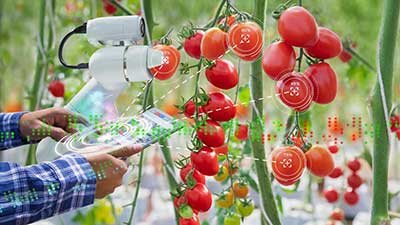Date: 17/01/2023
Relevance: GS-3: Science and Technology- Developments and their Applications and Effects in Everyday Life.
Key Phrases: artificial intelligence (AI) technologies, Precision farming, market-specific solutions, predicting upcoming weather patterns, Analysing farm data, AI chatbots, automation, labour shortages.
Why in news?
- The agriculture sector has come a long way with technology intervention bringing a paradigm shift in how farmers cultivate their crops.
- As the world population continues to proliferate at a fast pace and land becomes scarcer, people have to become more efficient in increasing their productivity and farm yield.
Scope of AI in agriculture:
- Considering the population size, the UN Food and Agriculture Estimate reveals that the global agricultural yield has to expand by 70 per cent by 2050.
- To assist the farmers in meeting the ever-growing food demand, the $5 trillion global agriculture industry is inclining towards artificial intelligence (AI) technologies.
- This is helping farmers adopt market-specific solutions for innovation, growth, and impact by improving a wide range of agriculture-related tasks imperative in the food chain.
Significance of artificial intelligence (AI) in the agriculture sector:
- Analysing farm data:
- Traditionally, a myriad of tasks was required to be handled by farmers manually, including pest control, soil monitoring, forecasting weather conditions, etc.
- Before the integration of AI, it was challenging for farmers to analyse data points on the ground daily.
- With the help of AI, it has become easier to predict several real-time factors such as weather, temperature, water usage, and soil conditions to make better decisions.
- For instance, AI enables farmers to make better farming choices from the planning stage to create more bountiful yields.
- Precision Farming
- In addition, AI-based technologies aid farmers in precision agriculture, further improving quality and accuracy in farming. The AI technology analyses data for detecting diseases in plants, pests, and poor nutrition in crops.
- Detecting weeds and toxins:
- The sensors also play a crucial role in detecting and targeting weeds and then deciding the appropriate herbicides to apply. This keeps excessive toxins at bay and results in healthy food production.
- Better forecasting:
- AI’s predictive models help farmers forecast significant factors influencing yield productivity. These models predict upcoming weather patterns to assist farmers in decision-making and attain agricultural accuracy.
- Seasonal and weather forecasting plays a crucial role in farming, especially in small farms with limited data and knowledge, and farmers cannot burn their money in experiments or guesswork.
- Small farms contribute to the agricultural economy and produce income for most of the farming community. Hence, AI implementation is necessary to keep such farms operational.
- Monitoring:
- Besides, AI enables farmers to monitor the fields more professionally than ever.
- The data captured through drones flying over the fields help farmers monitor the field in real-time with better efficiency.
- Through AI-enabled drone cameras, farmers can identify problematic areas in larger fields that are difficult to monitor by humans in lesser time.
Tackling labour shortages:
- Automation:
- Agriculture is a labour-intensive activity that traditionally required seasonal workers to harvest crops and monitor farms.
- With more people moving from an agrarian society to cities, farmers are facing a shortage of labour for the upkeep and output of their farms.
- As AI technology is transforming each business sector with automation, agriculture is not immune from its willingness to lend a helping hand to the farmers.
- AI bots can be used in multiple ways, from harvesting crops at a higher volume to locating problem areas in the field.
- Dissemination of information:
- Farmers can also use AI chatbots for technical assistance. Many agritech start-ups are taking initiatives to equip farmers with the technical know-how of modern farming practices.
- As a result, they help farmers with answers to various questions and provide advice and recommendations based on their queries.
- Cost efficiency:
- The deployment of technology also helps farmers acquire greater cost efficiency.
- Technology replaces several mundane and time-consuming human-oriented tasks with automation.
- Reducing labour and labour costs:
- Farmers can monitor their crops more accurately by eliminating laborious tasks and reducing errors and labour costs.
- Therefore, with less labour workforce, farmers can still meet the world’s ever-growing food demand with more efficiency and yield productivity.
Conclusion:
- The fundamental need to grow food will never fade away. In fact, it will increase with the growing population’s needs.
- Fortunately, AI will allow farmers to operate their farms at larger sizes with greater cost and time efficiency. With cognitive technologies, they can produce food with better productivity.
Source: The Hindu BL
Mains Question:
Q. How can artificial intelligence (AI) technologies help the agriculture sector overcome the most challenging hurdles in the sector? Discuss.






















